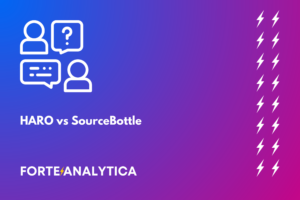As a business owner or manager, you may be looking for ways to increase your online visibility, attract new customers, and build your brand reputation.
One of the ways to achieve these goals is through search engine optimization (SEO), a set of practices aimed at improving your website’s ranking in search engine results.
HARO (Help a Reporter Out) is a free service that connects journalists with relevant sources and experts, but is it worth it for your business?
Read on to discover the benefits and drawbacks of HARO, and decide for yourself.
What is HARO? How does it work?
HARO is a platform that enables journalists and bloggers to find expert sources for their stories, and vice versa.
HARO was launched in 2008 by Peter Shankman, and acquired by Cision in 2010.
The service is free for both journalists and sources and relies on email alerts that are sent three times a day, from Monday to Friday.
Here’s how it works:
- Journalists sign up for HARO and submit queries on various topics and beats.
- HARO editors review the queries, edit them for clarity and relevance, and distribute them to their subscriber base.
- Sources who are interested in the queries can respond via email, and provide their name, contact information, and expertise.
- The journalist reviews the responses and contacts the most appropriate sources for their story.
What are the benefits of HARO?
- Exposure: HARO can provide your business with exposure to high-profile media outlets, such as The New York Times, Huffington Post, Forbes, and Insider.
- Links: if your response is selected by a journalist, you may receive a backlink to your website, which can improve your SEO and increase your organic traffic.
- Authority: being quoted as an expert on a topic can enhance your credibility and authority in your industry, and attract new customers, partners, and investors.
- Networking: HARO can help you build relationships with journalists, bloggers, and fellow experts, and discover new opportunities for collaborations and partnerships.
- No cost: HARO is free. There is HARO Pro which is a paid subscription to receive emails earlier than users on the free level.
What are the drawbacks of HARO?
- Time and effort: responding to HARO queries requires time and effort to craft a compelling pitch, stand out from the competition, and follow up with the journalist. Additionally, you may need to check your email frequently to catch the relevant queries before they expire.
- Quality control: HARO attracts a large number of responses, including spam, irrelevant, and low-quality pitches. This means that you may need to apply filters to separate the wheat from the chaff and avoid wasting your time on dead-end opportunities.
- Competition: HARO is a popular platform, which means that you may face fierce competition from other sources who also want to get exposure, links, and authority. This means that you need to find a way to differentiate yourself from the crowd and provide unique value to the journalist.
- Privacy: HARO requires you to share your personal and professional information, such as your name, company name, and email address, with the journalist. This means that you may receive spam, unsolicited emails, and other unwanted messages from third parties who got access to your data.
How to make the most of HARO?
If you decide to give HARO a try, here are some tips to make the most of it:
- Be selective: Choose the queries that fit your expertise, industry, and values. Don’t respond to every query that comes your way, as this may dilute your focus and waste your time.
- Be concise and compelling: Write a clear and concise pitch, highlighting your expertise, unique value proposition, and relevance to the query. Use bullet points, quotes, and statistics to support your claims, and make sure that your response is well-written and error-free.
- Be responsive: Respond to the query as soon as possible, preferably within 24 hours, to increase your chances of getting noticed by the journalist. Follow the journalist’s instructions, and provide the requested information in a timely and professional manner.
Be persistent: Don’t get discouraged if you don’t get a response from the journalist. Keep trying, and keep sending quality pitches to relevant queries. You never know when you may hit the jackpot.
FAQs
Is HARO a scam?
No, HARO is a legitimate and reputable platform that has helped thousands of sources and journalists to connect and collaborate over the years. However, like any online platform, it may attract some spam and fraud, so you need to be vigilant and use common sense.
Can HARO guarantee me media coverage?
No, HARO does not guarantee media coverage or any specific results. The platform is a tool that can help you to connect with journalists and increase your chances of getting quoted or cited, but it’s up to the journalist to decide whether to use your response or not.
Can I use HARO for link building purposes?
Yes, if your response is selected by a journalist, you may receive a backlink to your website, which can improve your SEO and increase your organic traffic. However, you should not abuse HARO by sending spammy or irrelevant responses, or by forcing journalists to include your link in their stories.
Can HARO substitute for other PR strategies and tactics?
No, HARO is not a substitute for other PR strategies and tactics, such as press releases, media events, social media outreach, or influencer marketing. HARO is just one tool in your PR arsenal that can supplement your existing efforts. You should use HARO in conjunction with other sources of media exposure and branding.


